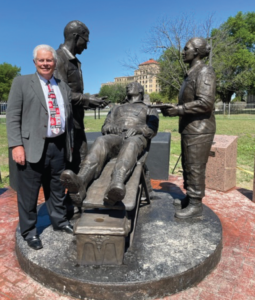Serving Those Who Serve
In March, I was thrilled to celebrate the dedication of the Army Dentistry Monument in San Antonio.
In March, I was thrilled to celebrate the dedication of the Army Dentistry Monument in San Antonio. My husband, Michael P. Rethman, DDS, MS, was a career Army dentist and served 26 years in the Army Dental Corps. He was also a member of the Association of Army Dentistry, the organization that worked diligently to make this monument a reality.
IN 1911, THE UNITED STATES ARMY DENTAL CORPS BECAME THE WORLD’S FIRST MILITARY ORGANIZATION TO PROVIDE DENTAL CARE

Along with the monument dedication, a visit to the Army Medical Museum at Fort Sam Houston prompted me to find out more about the history of Army dentistry.Here are a few interesting facts:
- During the Civil War, troops weren’t supplied with toothbrushes and military dentists did not yet exist. Because soldiers used their teeth to bite open gunpowder tubes and cartridges, the only oral health requirement was whether an enlistee had “a sufficient number of teeth in good condition to masticate his food properly, and to tear his cartridge quickly and with ease.”1 Later regulations specified that “total loss of all the front teeth, the eye-teeth, and first molars, even if only of one jaw” was cause for rejection.1
- In 1901, Congress authorized the Army to hire 30 dentists. Ten years later, the United States Army Dental Corps became the world’s first military organization to provide dental care. Before the Dental Corps became official, soldiers were expected to find care on their own. As you can imagine, this care was often primitive.
- John Sayre Marshall, MD, the first dental surgeon hired by the Army, is called the “father of the US Army Dental Corps.” He worked tirelessly for the recognition and implementation of dentists in the military. Marshall recalled seeing a man during the Civil War (prior to the Dental Corps) have his tooth extracted with a turnkey. According to his reports, the tooth was removed with great duress, as the soldier’s mandible was also broken in the process.
- The establishment of the Army Dental Corps significantly impacted the civilian status of dentistry as a profession. Before the Military Dental Corps Authorization Act in 1911, the words “dentistry,” and “dental profession“ had no significance under US law. Thus, recognition of the Army Dental Corps set precedent for the official recognition of dentistry as a profession.
I asked Mike to share his thoughts on serving as an Army dentist. “I hope aspiring young people will consider the same path,” he replied. “As a recipient of college and dental school scholarships from the Army, it was a wonderful opportunity.”
For more history of the Army Dental Corps, visit the Borden Institute and the Association of Army Dentistry.
Reference
- Bumgardner E. Disqualification for military service in the Civil War on account of loss of teeth. Dental Cosmos. 1894;36:429
From Dimensions of Dental Hygiene. May 2023; 21(5):6.

